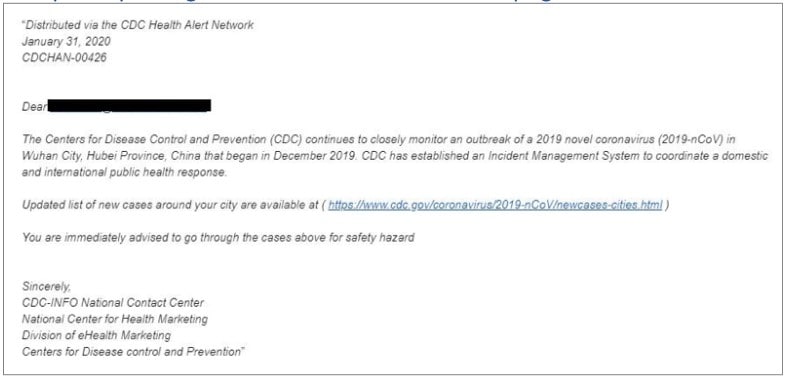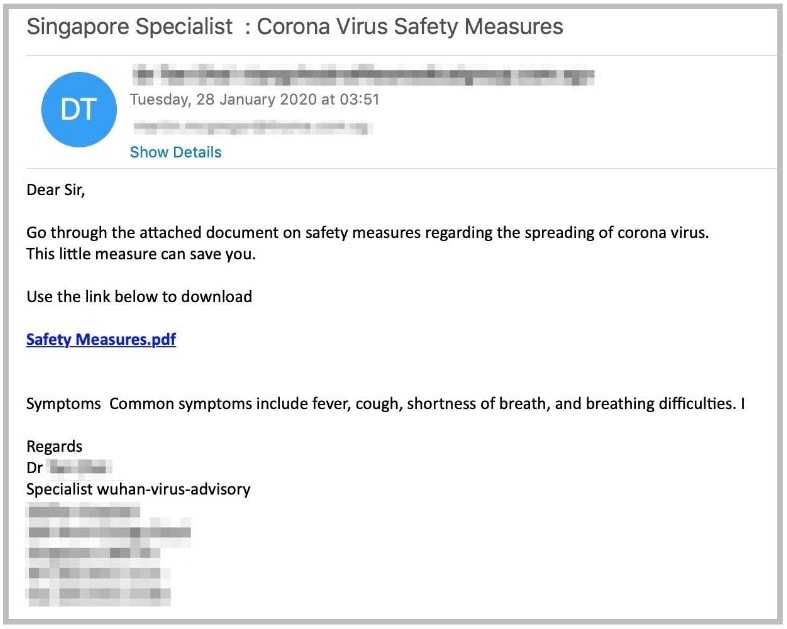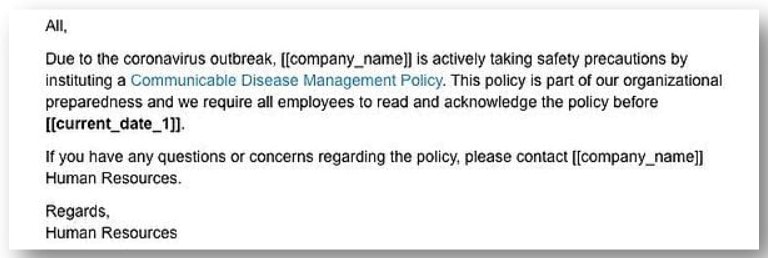Coronavirus phishing emails: How to protect against COVID-19 scams
Scammers are using phishing emails to profit from the coronavirus outbreak. Learn how to help avoid getting scammed.


Try Norton 360 with LifeLock Select FREE 30-Day Trial*
30 days of FREE* comprehensive antivirus, device security, online privacy, and identity theft protection with LifeLock.
Join today. Cancel anytime.
*Terms Apply
The overwhelming amount of news coverage surrounding the novel coronavirus has created a new danger — phishing attacks looking to exploit public fears about the sometimes-deadly virus.
How does it work? Cybercriminals send emails claiming to be from legitimate organizations with information about the coronavirus.
The email messages might ask you to open an attachment to see the latest statistics. If you click on the attachment or embedded link, you’re likely to download malicious software onto your device.
The malicious software — malware, for short — could allow cybercriminals to take control of your computer, log your keystrokes, or access your personal information and financial data, which could lead to identity theft.
The coronavirus — or COVID-19, the name of the respiratory disease it causes — has affected the lives of millions of people around the world. It’s impossible to predict its long-term impact. But it is possible to take steps to help protect yourself against coronavirus-related scams.
Here’s some information that can help.
How do I spot a coronavirus phishing email? Examples
Coronavirus-themed phishing emails can take different forms, including these.
CDC alerts. Cybercriminals have sent phishing emails designed to look like they’re from the U.S. Centers for Disease Control. The email might falsely claim to link to a list of coronavirus cases in your area. “You are immediately advised to go through the cases above for safety hazard,” the text of one phishing email reads.
What do the emails look like? Here’s an example of a fake CDC email. (All examples below come from the U.S. Health and Human Services website.)

Health advice emails. Phishers have sent emails that offer purported medical advice to help protect you against the coronavirus. The emails might claim to be from medical experts near Wuhan, China, where the coronavirus outbreak began. “This little measure can save you,” one phishing email says. “Use the link below to download Safety Measures.”
Here’s what a fake health-advice email looks like.

Workplace policy emails. Cybercriminals have targeted employees’ workplace email accounts. One phishing email begins, “All, Due to the coronavirus outbreak, [company name] is actively taking safety precautions by instituting a Communicable Disease Management Policy.” If you click on the fake company policy, you’ll download malicious software.
Here’s an example.

How do I avoid scammers and fake ads?
Scammers have posted ads that claim to offer treatment or cures for the coronavirus. The ads often try to create a sense of urgency — for instance, “Buy now, limited supply.”
At least two bad things could happen if you respond to the ads.
One, you might click on an ad and download malware onto your device.
Two, you might buy the product and receive something useless, or nothing at all. Meanwhile, you may have shared personal information such as your name, address, and credit card number.
Bottom line? It’s smart to avoid any ads seeking to capitalize on the coronavirus.
Tips for recognizing and avoiding phishing emails
Here are some ways to recognize and avoid coronavirus-themed phishing emails.
Like other types of phishing emails, the email messages usually try to lure you into clicking on a link or providing personal information that can be used to commit fraud or identity theft. Here’s some tips to avoid getting tricked.
- Beware of online requests for personal information. A coronavirus-themed email that seeks personal information like your Social Security number or login information is a phishing scam. Legitimate government agencies won’t ask for that information. Never respond to the email with your personal data.
- Check the email address or link. You can inspect a link by hovering your mouse button over the URL to see where it leads. Sometimes, it’s obvious the web address is not legitimate. But keep in mind phishers can create links that closely resemble legitimate addresses. Delete the email.
- Watch for spelling and grammatical mistakes. If an email includes spelling, punctuation, and grammar errors, it’s likely a sign you’ve received a phishing email. Delete it.
- Look for generic greetings. Phishing emails are unlikely to use your name. Greetings like “Dear sir or madam” signal an email is not legitimate.
- Avoid emails that insist you act now. Phishing emails often try to create a sense of urgency or demand immediate action. The goal is to get you to click on a link and provide personal information — right now. Instead, delete the message.
Where can I find legitimate information about the coronavirus?
It’s smart to go directly to reliable sources for information about the coronavirus. That includes government offices and health care agencies.
Here are a few of the best places to find answers to your questions about the coronavirus.
Centers for Disease Control and Prevention. The CDC website includes the most current information about the coronavirus. Here’s a partial list of topics covered.
- How the coronavirus spreads
- Symptoms
- Prevention and treatment
- Cases in the U.S.
- Global locations with COVID-19
- Information for communities, schools, and businesses
- Travel
World Health Organization. WHO provides a range of information, including how to protect yourself, travel advice, and answers to common questions.
National Institutes of Health. NIH provides updated information and guidance about the coronavirus. It includes information from other government organizations.

Try Norton 360 with LifeLock Select FREE 30-Day Trial*
30 days of FREE* comprehensive antivirus, device security, online privacy, and identity theft protection with LifeLock.
Join today. Cancel anytime.
*Terms Apply
Editorial note: Our articles provide educational information for you. Our offerings may not cover or protect against every type of crime, fraud, or threat we write about. Our goal is to increase awareness about Cyber Safety. Please review complete Terms during enrollment or setup. Remember that no one can prevent all identity theft or cybercrime, and that LifeLock does not monitor all transactions at all businesses. The Norton and LifeLock brands are part of Gen Digital Inc.

Want more?
Follow us for all the latest news, tips, and updates.